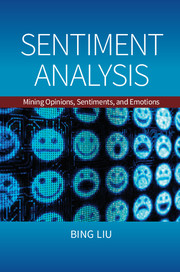Book contents
- Frontmatter
- Contents
- Preface
- Acknowledgments
- 1 Introduction
- 2 The Problem of Sentiment Analysis
- 3 Document Sentiment Classification
- 4 Sentence Subjectivity and Sentiment Classification
- 5 Aspect Sentiment Classification
- 6 Aspect and Entity Extraction
- 7 Sentiment Lexicon Generation
- 8 Analysis of Comparative Opinions
- 9 Opinion Summarization and Search
- 10 Analysis of Debates and Comments
- 11 Mining Intentions
- 12 Detecting Fake or Deceptive Opinions
- 13 Quality of Reviews
- 14 Conclusions
- Appendix
- Bibliography
- Index
7 - Sentiment Lexicon Generation
Published online by Cambridge University Press: 05 June 2015
- Frontmatter
- Contents
- Preface
- Acknowledgments
- 1 Introduction
- 2 The Problem of Sentiment Analysis
- 3 Document Sentiment Classification
- 4 Sentence Subjectivity and Sentiment Classification
- 5 Aspect Sentiment Classification
- 6 Aspect and Entity Extraction
- 7 Sentiment Lexicon Generation
- 8 Analysis of Comparative Opinions
- 9 Opinion Summarization and Search
- 10 Analysis of Debates and Comments
- 11 Mining Intentions
- 12 Detecting Fake or Deceptive Opinions
- 13 Quality of Reviews
- 14 Conclusions
- Appendix
- Bibliography
- Index
Summary
By now, it should be quite clear that words and phrases that convey positive or negative sentiment are instrumental for sentiment analysis. This chapter discusses how to compile such word lists. In the research literature, sentiment words are also called opinion words, polar words, or opinion-bearing words. Positive sentiment words such as beautiful, wonderful, and amazing are used to express some desired states or qualities while negative sentiment words such as bad, awful, and poor are used to express some undesired states or qualities. In addition to individual words, there are also sentiment phrases and idioms, for example, cost an arm and a leg. Collectively, they are called the sentiment lexicon (or opinion lexicon). From now on, when we say sentiment words, we mean both individual words and phrases.
Sentiment words can be divided into two types, base type and comparative type. All the preceding example words are of the base type. Sentiment words of the comparative type (which include the superlative type) are used to express comparative and superlative opinions. Examples of such words include better, worse, best, worst, and so on, which are comparative and superlative forms of the base adjectives or adverbs such as good and bad. We discuss comparative and superlative sentiment words further in Chapter 8. This chapter focuses on sentiment words of the base type.
There are three main existing approaches to compiling sentiment words: manual approach, dictionary-based approach (discussed in Section 7.1), and corpusbased approach (discussed in Section 7.2). The manual approach is labor-intensive and time-consuming, and is thus usually used as a check on automated approaches because automated approaches make mistakes. In Section 7.3, we will also discuss the issue of factual statements implying opinions, which has largely been overlooked by the research community.
This chapter is written in a survey style because past research has constructed numerous sentiment lexicons in many languages. Most of them are publicly available (see Section 7.4 for a list of them in English).
- Type
- Chapter
- Information
- Sentiment AnalysisMining Opinions, Sentiments, and Emotions, pp. 189 - 201Publisher: Cambridge University PressPrint publication year: 2015
- 1
- Cited by



